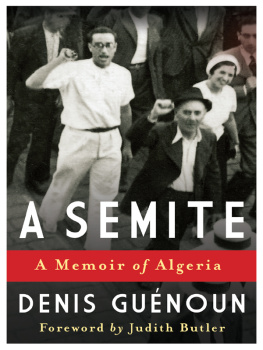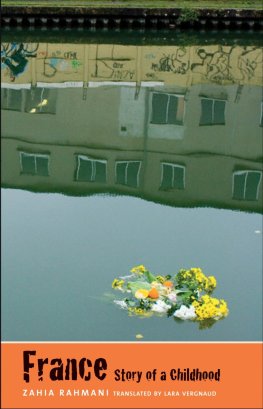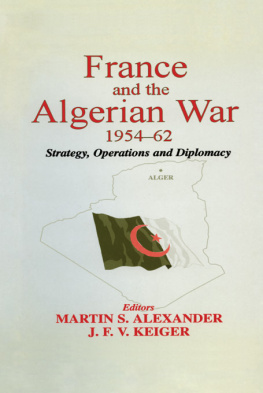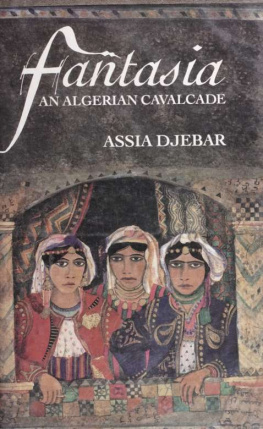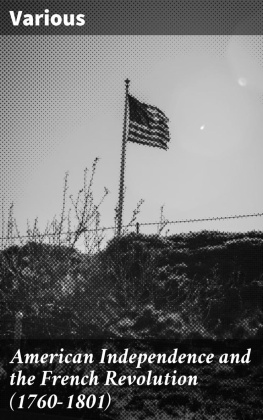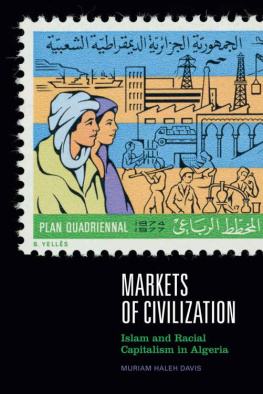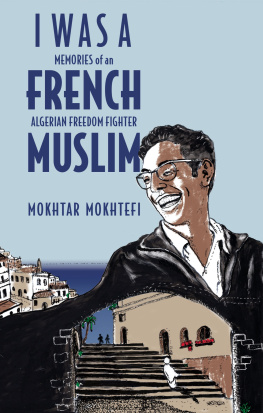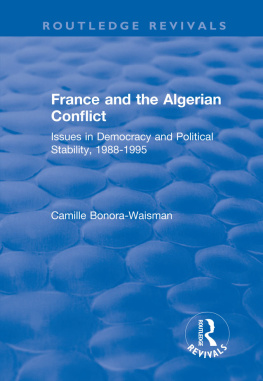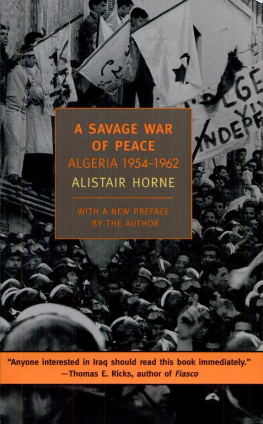A SEMITE
A SEMITE
A Memoir of Algeria
Denis Gunoun
Translated from French by Ann and William Smock
COLUMBIA UNIVERSITY PRESS
NEW YORK
Cet ouvrage a bnfici du soutien des Programmes daide la publication de lInstitut franais.
This work, published as part of a program of aid for publication, received support from the Institut franais.
Cet ouvrage, publi dans le cadre du programme daide la publication, bnficie du soutien du Ministre des Affaires Etrangres et du Service Culturel de lAmbassade de France rpresent aux Etats-Unis.
This work received support from the French Ministry of Foreign Affairs and the Cultural Services of the French Embassy in the United States through their publishing assistance program.
Columbia University Press
Publishers Since 1893
New York Chichester, West Sussex
cup.columbia.edu
Copyright 2002 Circe
Translation copyright 2014 Columbia University Press
All rights reserved
E-ISBN 978-0-231-53724-7
Library of Congress Cataloging-in-Publication Data
Gunoun, Denis, 1946 author.
[Smite. English]
A Semite : a memoir of Algeria / by Denis Gunoun ; translated from French by Ann and William Smock.
p. cm.
ISBN 978-0-231-16402-3 (cloth : alk. paper) ISBN 978-0-231-53724-7 (electronic)
1. Gunoun, Denis, 1946 2. JewsAlgeriaOranBiography. 3. AlgeriaHistoryRevolution, 19541962Personal narratives. 4. Jews, AlgerianFranceBiography. I. Smock, Ann, 1944 translator. II. Smock, William, translator. III. Title.
DS135.A3G8413 2013
944.0049240651dc23
[B]
2013023432
A Columbia University Press E-book.
CUP would be pleased to hear about your reading experience with this e-book at .
Jacket design: Noah Arlow
References to websites (URLs) were accurate at the time of writing. Neither the author nor Columbia University Press is responsible for URLs that may have expired or changed since the manuscript was prepared.
for Lo,
Hlio and Nathan, Sarah and Faustine,
Abel, Marius, Lucas, and Antoine
CONTENTS
This book is clearly a memoir, but settling on the genre does very little to orient us toward what is to come. The title, A Semite, seems to identify one among several Semites. And yet, several questions emerge as the story begins: What is a Semite? And who is included within its terms? Who talks this way? And under what conditions is anyone called a Semite or describes oneself through this term? The word, of course, haunts from the start, since we know it most clearly through the history of anti-Semitism. Anti-Semitism is a confusing word for many reasons. It is not an opposition to Semitism, since it would be unclear what an ideology of the Semite might be. But it is an opposition to the Semite that has itself assumed ideological form. But what or who does the anti-Semite oppose? And if anti-Semitism is a set of beliefs, a mode of being, an ideological formation, what holds it together apart from its animus? Does the animus, in fact, obliterate the Semite who is its object? Does anyone in the midst of anti-Semitism actually ask after the history and meaning of the Semite?
Denis Gunouns memoir is about his Algerian and Jewish father, trying to reconstruct his fathers history, one that is at once personal and historical. In one conversation, the father seeks to explain to his son what meaning the Semite has for him, and the son begins to parse the political lexicon in which he lives. The title takes on new meanings in this context. This is the word that the father offers the son in the late 1950s, when the boy is a teenager; it is the substance of paternal counsel and demand; it is a way of being named and naming oneself in a very particular set of historical contexts. It is the name that binds them together, but also the name that binds Arab and Jew. The son asks the father who they are, the two of them, their family and people, and the father answers in a series of statements, each building upon and qualifying the one that comes before. The father gives him this one word, but in the context of an analysis of a politically fraught network of words: French, Jew, Arab, Algerian, European.
The child asks whether he and his father are French, which means that the child is already unclear, and that the category holds sway over their lives only with some unease. The answer the father gives is yes, and he explains that we were here before the French. If we were in Algeria before the French, we are presumably something other than French. And yet, they are French, or have become French, or are becoming French in ways that cannot be fully anticipated even when the father gives this answer to the young boy. Are we Arabs? the son inquires. And at least here there is no sense that one is either French or Arab, though perhaps it is the workings of that mutually exclusive framework that the son seeks to interrogate with the language he has. The fathers answer is less clear: not exactly, which means, of course, that in some sense yes, or that they can only be understood rightly by understanding that the name, the appearance, the food, the language are clearly Arabic, and though the paternal line all speaks Arabic, the inquiring son is not given that language, so it would seem that French is taking the place of Arab in the course of the sons life. Jews? the child queries, probing to see how that word feels in the mouth, and here the father gives several answers. Judaism is a religion, and we are not at all religious. Hitler and the collaborationists, however, did not ask any Jew whether he or she was religious before they were destroyed. One cannot deny being a Jew without insulting the dead. So yes, to that question, the father instructs the child, you must answer yesbut this is an ethical demand, and not precisely a description of what is. In the end, the father offers Semites, which, he explains, means both Arab and Jew or, rather, names their commonality, proximity, intertwining. We are like Arabs, we lived close together on the western shore of Algeria. That is what the word Semite says, either Jew or Arab without distinction, what Jews and Arabs share, what they are together.
Of course, the father might have said Arab Jew, sometimes referred to now as the Mizrachim, indicating those Jews who descend from Arab cultures and regions (Yemen, Morocco, Iraq, Persia, Egypt, Tunisia, Algeria, Afghanistan, Syria, to name a few). When they live together in alliance, they are Semites, but when they fail to do so, the word flounders and loses its referential force. It does not name an identity, but rather a set of abiding relations, both historical and promissory.
Moreover, the term names an interpellation: who is called a Semite and who is included when name-calling becomes anti-Semitic? A mode of solidarity is unwittingly acknowledged as the Semite is either Jewish or Arab or both.
The sons relation to the father pivots on the parsing of these categories. The son asks why Semite has to include the Jews at all, and the father explains that it is because of the French that both sides of the term, Arab and Jewish, must be held together. In 1870, the French government declared the indigenous Jews of Algeria to be citizens of France, but not the Arabs. A division and inequality were introduced that had to be politically opposed. One way to do that is to insist that Semite refers to an unbreakable bond, a name for resistance itself. It matters what language was used between father and son, but also between Jew and Arab. Bonds were wrought and broken by virtue of speech acts and forms of nomination. Ambivalence emerges in the heart of this story, since it was this same father who instructs his son first that he is French even as he faults the French for historically producing the inequalities he opposes. But by the time this conversation takes place, they are living in the aftermath of European fascism as well as opposing those French settlers who wish to keep colonial control over Algeria (including the infamous OAS [

